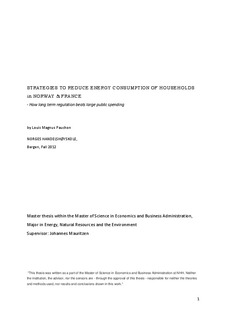Strategies to reduce energy consumption of households in Norway & France : how long term regulation beats large public spending
Master thesis
Permanent lenke
http://hdl.handle.net/11250/169387Utgivelsesdato
2012Metadata
Vis full innførselSamlinger
- Master Thesis [4372]
Sammendrag
Through a data and qualitative analysis of the French and Norwegian household energy consumption, I argue that the energy price, energy costs, and ownership percentage; interact and strengthen the effect of regulations, policies and financial incentives. The goal is to reduce consumption without spending too much on financial incentives. Consistent and long term regulation combined with a high volatile market price can reduce the need for financial incentives and thus public expenditure. Over time effects like high prices, high energy costs for households and high percentage of ownership have an interaction effect with the national regulation. It is clear in the case of Norway that having those favorable structural factors and an ambitious and constant building regulation over time leads today to an efficient housing stock. The energy consumption per person is reducing and investments in energy efficient technology are high with a minimum of financial incentives. The French case suggests the opposite that with reducing energy costs over time and a late and less ambitious historic building regulation, consumption per person rises. This can explain why France is currently spending large amounts in financial incentives (tax credits, lower V.A.T. and zero-interest loans) to launch energy investments in France. The results are positive, but the amount spent may be larger than necessary.
